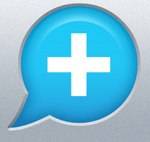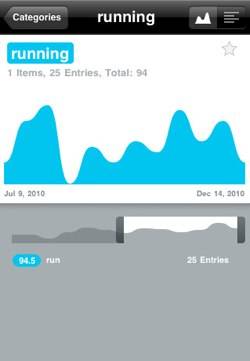If you’ve ever seen New York data visualization specialist Nicholas Felton’s Annual Reports on sites like LifeHacker or here on ReadWriteWeb, you probably remember the giggly feeling many of us feel when imagining that the beautiful charts and graphs he publishes were about the minutia of our own lives. Thanks to the New Years Eve release of a new iPhone app from Felton’s company Daytum, those visualizations can illustrate your days, weeks, months and years.

In 2008, Felton’s Annual Report stated that he took 548 subway trips, 107 taxis, 12 flights, 19 buses, two ferries and 64 visits to the gym that year. His average rate of movement through the year was just under 5 miles per hour and he’s got some beautiful graphs to illustrate that. The new Daytum iPhone app makes it easy for you to track and graph those or any other kinds of activities day by day through your own life. It’s a very well designed app, too.
Josh Rubin wrote up the new app this morning on the blog Cool Hunting. “The app allows you to work offline–adding, editing and deleting entries–as well as keep track of favorite items for quick reference,” Rubin writes. “… switching between accounts, graphing data or providing convenient access for common functions help the app retain its purpose of everyday use. Fully integrated with Daytum’s site, the app can be used in tandem or stand-alone and for existing users it will import all of the past data you’ve entered at daytum.com.”

Some users have reported bugs with the app, but I haven’t seen any yet in my testing. The user experience is remarkably well designed. On every screen I’ve encountered so far, whatever I hope the app does – it does, smoothly.
It’s a beautiful app and I hope I can remember to enter things into it consistently. So far I’m keeping track of push-ups and of articles here on ReadWriteWeb that I’ve edited. It‘s really easy to add any kind of action you want to track, though.
As with all these kinds of quantified self apps, the absence of a subcutaneous monitoring implant (as good as that is in the free will category) significantly raises the barrier to regular user input.
It’s easy to chalk up interest in these kinds of apps as a New Year’s fluke, fitness tracker RunKeeper for example dropped the price of its iPhone app to free on New Years Eve and today reported that it’s seen an incredible 1 million downloads in 4 days!
We’re seeing an increase in data-as-platform software and services all year long, though. These kinds of apps, services that allow us to capture data about what used to be called the off-line world in order to visualize patterns and learn of changes, are likely to be very big into 2011 and beyond.

















